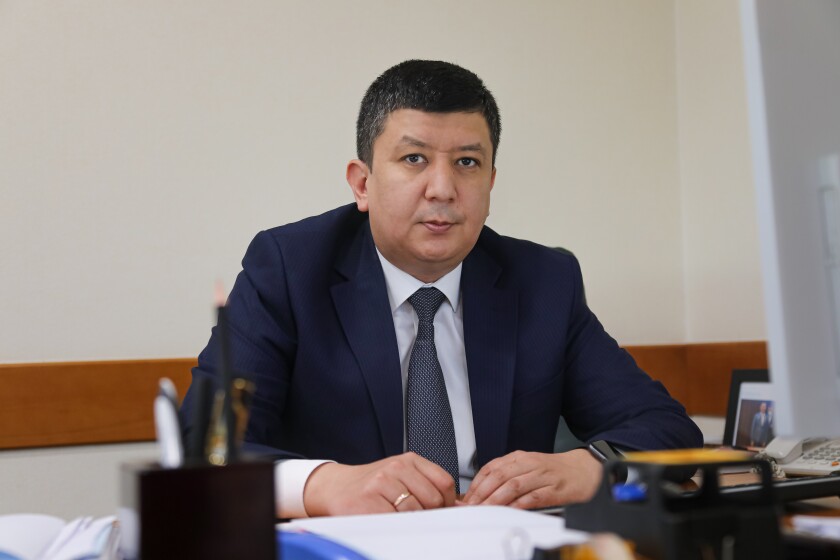GlobalMarkets: How has the economy and the industrial sector weathered the pandemic?
Bobur Abdinazarov, Deputy Minister of Economic Development and Poverty Reduction, Uzbekistan: Initially, it was very difficult. Quarantine was introduced in March and this had a serious impact on the economy. We started thinking about what sectors of the economy need to be supported during a pandemic. For instance, in the construction industry we asked firms to organise disinfected accommodation for workers. Then we turned to the industrial producers and instituted a similar system, so that travel was minimised, all facilities were kept sterilised and there was regular testing.
Even during the quarantine period, we in government were keeping in close contact with thousands of industrial companies and producers at the regional level to help solve problems. For example, some firms said they couldn’t bring in foreign exports to install equipment for new projects. We organised flights and strict quarantine to bring in experts. Although in April the industrial sector had contracted by 6% year-on-year, by the end of the year it had actually grown 0.7% and GDP growth across the whole economy was 1.7%.
GlobalMarkets: Has the pandemic affected the reform and privatisation process?
Abdinazarov: Once we started to successfully cope with the pandemic we continued to proceed with the reform process. So in October there was a decree published to start a new era of transformation for state-owned enterprises (SOEs) across the country. We are pursuing privatisation and transformation in multiple directions, and there has been great progress. During an initial phase in 2019, we unbundled large companies in the oil and gas sector. Uzbekneftegaz has been split into three companies: extraction, transportation and distribution. The same thing has happened to Uzbekenergo.
Now in line with the October decree we are working with consultants to transform those companies and increase operational efficiency. The same thing is happening in other sectors like transportation, where automaker Uzavtosanot is being transformed with help from Boston Consulting Group. In the metals and mining sector we are pursuing a similar unbundling to the oil and gas sector. So we have our three largest companies – Navoi Mining and Metallurgical Combinat, which mines gold and uranium; Almalyk Mining and Metallurgical Combinat, which produces mainly copper, silver and, gold; and Uzmetkombinat, which produces ferrous metals. All these companies are carrying out new projects and being transformed.
GlobalMarkets: How is the government working to attract more foreign investment into mining and metals?
Abdinazarov: We want more investors to come and utilise Uzbekistan’s resource base, but there is also infrastructure that we have to create first. The first infrastructure element is the legislative and taxation framework. Second, would be reserves and identifying the relevant volume and location. So this year and next year there is more attention being paid to exploration work. The State Committee for Geology and Mineral Resources is carrying out government programmes to increase the mineral resource base.
There are also plans for more advanced production that require help from foreign companies. So, the President has approved a new resolution to establish a copper cluster. The Ministry of Economic Development and Poverty Reduction will house a project office for this initiative. Our main task is to hire a consortium of consulting companies to calculate the reserves and help prepare bidding documents. We are going to choose two fields - one for copper and the other for a rare metal. We are planning on accepting bids from top international companies in the mining and metals sector. We understand that mining is not like cereal production, where each field has largely the same parameters. Different sites and deposits will require different approaches. But the key thing is that the approach should be open, transparent and in-line with international best practice.
GlobalMarkets: What are the other priorities for the sector’s development?
Abdinazarov: We will continue to work with international financial institutions, consultants and other experts. This puts us on a steep learning curve and every day we gain a better understanding of the development process. We are working with different Uzbek and international universities to help improve our research capabilities and the education of the next generation. The research and development process is very capital intensive, and so we are also trying to structure things so that there is greater transfer of technology and knowledge to our key companies and the industry in general.
Environmental issues are becoming an ever greater priority. Lowering CO2 emissions is a key objective. We know that all these projects in the mining industry and across the industrial sector should be aligned with the aim of a green economy. So this will be one of the directions we will move towards next.

